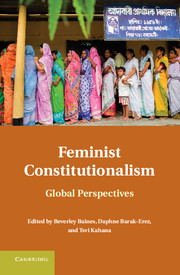Book contents
- Frontmatter
- Contents
- Foreword
- Contributors
- Introduction
- Part I Feminism as a Challenge to Constitutional Theory
- Part II Feminism and Judging
- Part III Feminism, Democracy, and Political Participation
- 9 The Gendered State and Women's Political Leadership
- 10 On Parity, Interdependence, and Women's Democracy
- 11 Women's Involvement in International Constitution-Making
- 12 Between Constitutional Jurisdiction and Women's Rights Organizations
- 13 The Promise of Democratic Constitutionalism
- Part IV The Constitutionalism of Reproductive Rights
- Part V Women's Rights, Multiculturalism, and Diversity
- Part VI Women between Secularism and Religion
- Index
- References
13 - The Promise of Democratic Constitutionalism
Women, Constitutional Dialogue, and the Internet
Published online by Cambridge University Press: 05 June 2012
- Frontmatter
- Contents
- Foreword
- Contributors
- Introduction
- Part I Feminism as a Challenge to Constitutional Theory
- Part II Feminism and Judging
- Part III Feminism, Democracy, and Political Participation
- 9 The Gendered State and Women's Political Leadership
- 10 On Parity, Interdependence, and Women's Democracy
- 11 Women's Involvement in International Constitution-Making
- 12 Between Constitutional Jurisdiction and Women's Rights Organizations
- 13 The Promise of Democratic Constitutionalism
- Part IV The Constitutionalism of Reproductive Rights
- Part V Women's Rights, Multiculturalism, and Diversity
- Part VI Women between Secularism and Religion
- Index
- References
Summary
Introduction
Mainstream constitutionalism has been slowly but surely turning its back on the courts. For many years, the notion of a constitution was synonymous with the notion of judicial review. Conventional wisdom held that we have a constitution to restrain majorities and legislatures. At the birth of a nation, or at some pivotal point in its history, the polity determines long-term principles to guide it for generations to come. These principles must be put in general terms to allow for adaptability and adjustments over time. They also limit the power of the government, and therefore must be enforced by an external institution, one that is not a directly publicly accountable part of government. This institution is the courts. When constitutional principles are not clear, the courts are charged with interpreting them. However, such conventional wisdom is no more. Many scholars across the globe have been advocating the replacement of judicial supremacy-based constitutionalism with what we call democratic constitutionalism. Unlike constitutional models that exemplify legislative supremacy, democratic constitutionalism favors a supreme and entrenched constitution. However, unlike under a system of judicial supremacy, democratic constitutionalism leaves the final word on constitutional matters in the hands of the elected lawmakers.
The merits of this middle-ground model of constitutionalism have been the subject of much debate in the literature. However, the relationship between democratic constitutionalism and feminism has not yet been explored. In this chapter, we offer a first reflection on this topic and argue that democratic constitutionalism provides important opportunities for the direct participation of women in discussions of constitutional issues.
- Type
- Chapter
- Information
- Feminist ConstitutionalismGlobal Perspectives, pp. 240 - 260Publisher: Cambridge University PressPrint publication year: 2012



